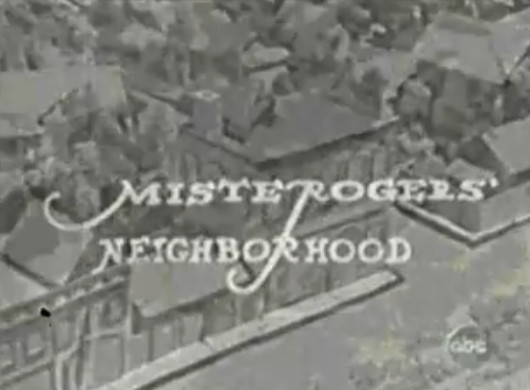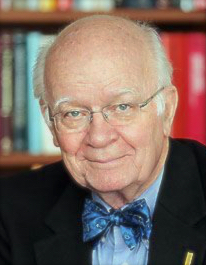The Morality of Mister Rogers
Sightings deadlines arrive around weekends
 Sightings deadlines arrive around weekends. As a public service in these dark times, we at the Center like to help spread some Sabbath cheer, a TGIF—“Thank God It’s Friday”-like—relief from the drabness-cum-terror which colors, or discolors, so much we have endured during the week. Lately, it has been hard to find much to cheer, but we remain committed to the search. Sometimes we get pleasant surprises and feel called upon to report on them, which in our case means purloining writings of others who help us end the week on an “up” note, summoning ideas that will inspire those who do their own sightings here. Thursday last, when we were just about ready to give up the weekly search, came a twofold prospect: David Brooks and Fred Rogers.
Sightings deadlines arrive around weekends. As a public service in these dark times, we at the Center like to help spread some Sabbath cheer, a TGIF—“Thank God It’s Friday”-like—relief from the drabness-cum-terror which colors, or discolors, so much we have endured during the week. Lately, it has been hard to find much to cheer, but we remain committed to the search. Sometimes we get pleasant surprises and feel called upon to report on them, which in our case means purloining writings of others who help us end the week on an “up” note, summoning ideas that will inspire those who do their own sightings here. Thursday last, when we were just about ready to give up the weekly search, came a twofold prospect: David Brooks and Fred Rogers.
Brooks offered a New York Times column on “Fred Rogers and the Loveliness of the Little Good,” which led me to fall into the deadly sin of envy, then to sin against the commandment not to steal. We thus steal enviously from Brooks—who often leadeth many of us into temptation—and let him do the heavy lifting for this week. Brooks blew no trumpets, spilled no secrets, and made no big claims. All well and good. Those are rarely what we look for when we read Brooks’s columns or watch and listen to “Shields and Brooks” on PBS NewsHour Fridays.
So, here is Brooks, opening July 5: “Often people are moved to tears by sadness, but occasionally people are moved to tears by goodness. That’s what happens to the audiences of ‘Won’t You Be My Neighbor?’ the new documentary about Fred Rogers.” Click the link above and read the column to bring about recall of, or new acquaintance with, the thirty-plus-year-long television career of “Mister Rogers.”
Trust me trusting Brooks as I come to a key line: “The power is in Rogers’s radical kindness at a time when public kindness is scarce” and the TV program’s reminder “that, oh yes, that’s how people can be.” Then follow Brooks’s lines, which brought me back to reality: “Mister Rogers was a lifelong Republican and an ordained Presbyterian minister” whose “show was an expression of the mainline Protestantism that was once the dominating morality in American life.” We can debate the pros and cons and ups and downs of the idea of a “dominating morality,” but it’s good to be reminded of what Brooks sees in Rogers, namely his “drawing on a long moral tradition, that the last shall be first.”
That tradition, in this line from Brooks, sometimes drew upon explicit biblical impulses, commands, and promises. But it could also draw upon numerous other sources which frequently get obscured, challenged, or virtually overcome by what Brooks calls “an achievement-oriented success culture … that swung too far from humble and earnest caritas.” On the day before the Brooks column appeared, a.k.a. the Fourth of July, there were moments when, nationally, community-park-goers and TV watchers got glimpses of fellow citizens who had not “swung” all the way. They can be found and encouraged even now.
Let Brooks provide the coda: “Rogers was singing from a song sheet now lost, a song sheet that once joined conservative evangelicals and secular progressives. The song sheet may be stacked somewhere in a drawer in the national attic, ready for reuse once again.” One hopes.
Photo Credit: Amber Case/Flickr (cc)
 Martin E. Marty (PhD’56) is the Fairfax M. Cone Distinguished Service Professor Emeritus of the History of Modern Christianity at the University of Chicago Divinity School. His biography, publications, and contact information can be found at www.memarty.com. Martin E. Marty (PhD’56) is the Fairfax M. Cone Distinguished Service Professor Emeritus of the History of Modern Christianity at the University of Chicago Divinity School. His biography, publications, and contact information can be found at www.memarty.com. |
Sightings is edited by Brett Colasacco (PhD’18). Sign up here to get Sightings by email. You can also follow us on Facebook and Twitter.


